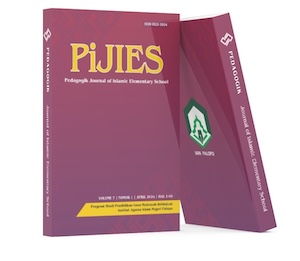Inovasi Pembelajaran Ilmu Pengetahuan Sosial Melalui Strategi Edutainment
DOI:
https://doi.org/10.24256/pijies.v8i2.6836Keywords:
inovasi pembelajaran, ilmu pengetahuan sosial, strategi edutainment, pendidikan dasar, studi kualitatifAbstract
Penelitian ini mengkaji inovasi pembelajaran Ilmu Pengetahuan Sosial (IPS) melalui strategi edutainment di SD Negeri 1 Bancar, sebagai respons atas rendahnya motivasi dan hasil belajar siswa yang disebabkan oleh dominannya metode pembelajaran konvensional. Dengan pendekatan kualitatif deskriptif, data dikumpulkan melalui wawancara mendalam, observasi partisipatif, dan analisis dokumentasi yang melibatkan guru dan siswa kelas IV, V, dan VI. Temuan penelitian menunjukkan bahwa penerapan strategi edutainment melalui permainan digital, role playing, dan pemanfaatan platform digital berhasil meningkatkan motivasi, partisipasi aktif, dan hasil belajar siswa secara signifikan. Namun, tantangan seperti kurangnya pelatihan guru, keterbatasan infrastruktur teknologi, dan kesulitan dalam menyusun instrumen penilaian yang komprehensif teridentifikasi. Studi ini menyimpulkan bahwa strategi edutainment merupakan solusi yang efektif untuk merevitalisasi pembelajaran IPS, namun memerlukan dukungan sistemik melalui pengembangan profesional guru, peningkatan sarana prasarana, dan kolaborasi kebijakan. Rekomendasi untuk penelitian selanjutnya mencakup perluasan cakupan sampel, studi longitudinal, serta eksplorasi integrasi teknologi emerging seperti augmented reality dan artificial intelligence dalam pembelajaran berbasis edutainment.
References
Asep, A., Barus, C. S. A., & Sohilait, D. (2024). Implementasi Kurikulum Merdeka dalam Pembelajaran IPS di Indonesia: Sebuah Systematic Review. Jurnal PIPSI (Jurnal Pendidikan IPS Indonesia), 9(3), 200-213. https://dx.doi.org/10.26737/jpipsi.v9i3.5869
Castellani, B., & Hafferty, F. W. (2009). Sociology and complexity science a new field of inquiry.
Chasanah, M., & Ningsih, T. (2023). Analisis Empat Kompetensi Guru Dalam Mengembangkan Pembelajaran IPS Di MI Ma'arif NU Penaruban. Jurnal Kependidikan, 11(1), 105-117. https://doi.org/10.24090/jk.v11i1.8440
Clark, M. C., & Wilson, A. L. (1991). Context and rationality in Mezirow’s theory of transformational learning. Adult Education Quarterly, 41(2), 75-91
Deci, E. L., & Ryan, R. M. (2000). The "What" and "Why" of Goal Pursuits: Human Needs and the Self-Determination of Behavior. Psychological Inquiry, 11(4), 227-268.
Febriani, M. (2021). IPS Dalam Pendekatan Konstruktivisme (Studi Kasus Budaya Melayu Jambi). Aksara: Jurnal Ilmu Pendidikan Nonformal, 7(1), 61-66. https://doi.org/10.37905/aksara.7.1.61-66.2021
Guskey, T. R. (2002). Professional Development and Teacher Change. Teachers and Teaching, 8(3), 381-391.
Haryadi, H. (2017). Efektifitas Strategi Pengajaran Edutainment Dengan Metode Picture And Picture Terhadap Konsentrasi Belajar Matematika Materi Pokok Himpunan Pada Siswa Kelas VII MTS Darussalam BERMI Tahun Pelajaran 2016/2017. JIME, 3(2), 81-98.
Hastuti, L. (2020). Strategi Edutainment Dalam Pembelajaran Pendidikan Agama Islam Dan Budi Pekerti Di Smp Negeri 1 Purbalingga Tesis. Pendidikan Agama Islam Dan Budi Pekerti, 9(1), 978.
Kolb, D. A. (1984). Experiential Learning: Experience as the Source of Learning and Development. Prentice-Hall.
Kristin, F. (2016). Efektivitas Model Pembelajaran Kooperatif Tipe Stad Ditinjau Dari Hasil Belajar Ips Siswa Kelas 4 Sd. Scholaria: Jurnal Pendidikan Dan Kebudayaan, 6(2), 74-79. https://doi.org/10.24246/j.scholaria.2016.v6.i2.p74-79
Marjiyah, S., & Ningsih, T. (2021). Peran Orang Tua Dalam Pembelajaran Jarak Jauh Pada Masa Pandemi Covid-19 Di Madrasah Ibtidaiyah Muhammadiyah Cabang Purbalingga. Jurnal Kependidikan, 9(1), 53-68. https://doi.org/10.24090/jk.v9i1.5619
Mayer, R. E. (2001). Multimedia Learning. Cambridge University Press.
Mayer, R. E. (2009). Multimedia Learning (2nd ed.). Cambridge University Press.
Megawati, R., & Ningsih, T. (2020). Pembentukan Karakter Melalui Pembelajaran Ilmu Pengetahuan Sosial (IPS). Jurnal Pendidikan, 8(2), 249-263.
Mishra, P., & Koehler, M. J. (2006). Technological Pedagogical Content Knowledge: A Framework for Teacher Knowledge. Teachers College Record, 108(6), 1017-1054.
Prasetio, T. A., & Ningsih, T. (2024). Pengaruh Media Pembelajaran Lapbook Dalam Meningkatkan Hasil Belajar Peserta Didik Pada Mata Pelajaran IPS Kelas IV Di Madrasah Ibtidaiyah Negeri 1 Banyumas. Pendas: Jurnal Pendidikan Dasar, 09, 245-254.
Pratiwi, A. D., Amini, A., Nasution, E. M., Handayani, F., & Mawarny, N. P. (2023). Identifikasi Permasalahan Pembelajaran IPS Di Semua Tingkat Pendidikan Formal (SD, SMP Dan SMA). El-Mujtama: Jurnal Pengabdian Masyarakat, 3(2), 606-617. https://doi.org/10.47467/elmujtama.v3i3.2818
Ramadhan, M. R. (2020). Implementasi Strategi Pembelajaran Edutainment Berbasis Karakter Dalam Pendidikan Agama Islam. FIKROH: Jurnal Pemikiran Dan Pendidikan Islam, 13(2), 201-211. https://doi.org/10.37812/fikroh.v13i2.114
Rogers, E. M. (2003). Diffusion of Innovations (5th ed.). Free Press.
Sweller, J. (1988). Cognitive Load During Problem Solving: Effects on Learning. Cognitive Science, 12(2), 257-285.
Vygotsky, L. S. (1978). Mind in Society: The Development of Higher Psychological Processes. Harvard University Press.
Wiggins, G. (1990). The Case for Authentic Assessment. Practical Assessment, Research, and Evaluation, 2(2). https://doi.org/10.7275/ffb1-mm19
Wijayanti, M. T., & Lutfi, A. (2021). Pengembangan Permainan Element Go Sebagai Media Pembelajaran Pada Materi Konfigurasi Elektron Yang Mempengaruhi Retensi Peserta Didik. PENDIPA Journal of Science Education, 5(3), 269-276. https://doi.org/10.33369/pendipa.5.3.269-276
Zahra Rosyiddin, A. A., Johan, R. C., & Mulyadi, D. (2022). Inovasi Pembelajaran Sebagai Upaya Menyelesaikan Problematika Pendidikan Indonesia. Inovasi Kurikulum, 19(1), 44-53. https://doi.org/10.17509/jik.v19i1.42679
Downloads
Published
How to Cite
Issue
Section
Citation Check
License
Copyright (c) 2025 Rakhmat Rakhmat, Tutuk Ningsih

This work is licensed under a Creative Commons Attribution-ShareAlike 4.0 International License.
Copyright notice:
Authors retain copyright and grant the journal right of first publication with the work simultaneously licensed under an Attribution-ShareAlike 4.0 International (CC BY-SA 4.0) (https://creativecommons.org/licenses/by-sa/4.0/) that allows others to share the work with an acknowledgement of the work's authorship and initial publication in this journal.
Authors are able to enter into separate, additional contractual arrangements for the non-exclusive distribution of the journal's published version of the work (e.g., post it to an institutional repository or publish it in a book), with an acknowledgement of its initial publication in this journal.
Authors are permitted and encouraged to post their work online (e.g., in institutional repositories or on their website) prior to and during the submission process, as it can lead to productive exchanges, as well as earlier and greater citation of published work (See the Effect of Open Access)







 This is an open access article under the
This is an open access article under the 